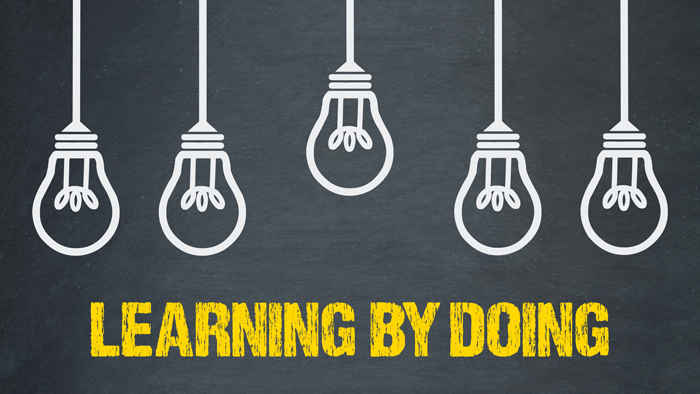By David Wiley, Chief Academic Officer
I’ve recently had a fair amount of time in which I could think and ponder (but not do much else), and I find that my thoughts are turning more and more often to improving student learning. How can we creatively use all the tools, research, and other resources available to us to improve student learning? For example, how can we leverage the unique affordances of OER in order to improve student learning? How can we harness the power of data in order to improve student learning? How can we do this work as an open community where we can all benefit from each others’ efforts, rather than duplicating them?
Of course, there’s not a single answer to questions like these. But as I’ve pondered what a first step might look like, I keep coming back to these few thoughts:
- Practice, feedback, and the DOER effect. Research from CMU suggests that online interactive practice with feedback is 6x more effective at supporting student learning than reading texts or watching videos. Yet, when we create OER, we almost always write texts or record videos.
- Professional development. If online interactive practice with feedback is so much more effective, why do we keep writing text and recording videos? Probably because everyone knows how to use Word and the camera in their phone, but far fewer people know how to create interactive activities. This is, at least in part, a knowledge problem that we can solve with education!
- OER and RISE analysis. Once people know how to create online interactive practice activities with feedback, how will they decide between the thousands of topics they might create them for? Lumen’s RISE analysis provides a national view into the specific topics that students are struggling with. And OER give us all the legal permissions we need to add online interactive practice activities with feedback directly into the content.
So, here’s what we’re going to do first – a virtual hackathon!
- Ross Strader (Lumen’s Director of Learning Engineering) and I are going to host a pair of virtual hackathons, one on East Coast time (mine) and one on West Coast time (his).
- These will start like a workshop / webinar, with an introduction to H5P – an open source toolkit for creating interactive activities. We’ll teach you how to use H5P to create online interactive practice activities with feedback, walking through several examples.
- We’ll then walk through the results of Lumen’s most recent RISE analyses, highlighting the topics where students across the country would benefit most from online interactive practice activities with feedback.
- We’ll then turn you loose to choose a topic and build an interactive. Throughout the virtual hackathon, either Ross or I will be online in the webinar space to answer any questions you have and support you through the process.
- Finally, we’ll invite you to share your new interactive in a public Google doc and on Twitter (if you use it) using a specific hashtag. Everyone who shares an interactive will receive a certificate of participation, and people whose interactives are integrated into Lumen’s OER-based Waymaker courseware will get access to additional impact documentation designed to be shared with your tenure and promotion committee.
I’m really excited about this idea and believe we can have a huge impact on student learning as we work together to leverage OER, data, and other opportunities ahead of us. To join one of the webinars, click on the Hackathon time that works best for you to register:
Thursday, July 18th starting at 9 am EST, or Thursday, July 18th starting at 2 pm PST
If neither time works, click here to request the Hackathon recording.
Looking forward to seeing you then!

